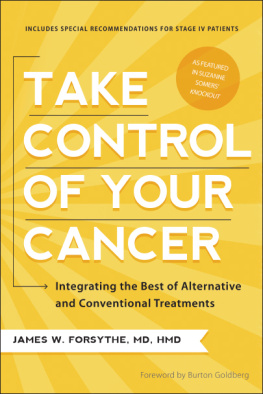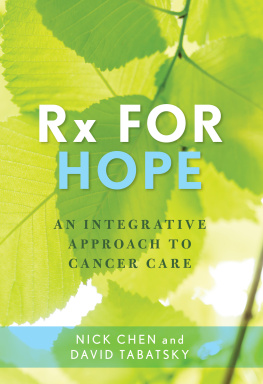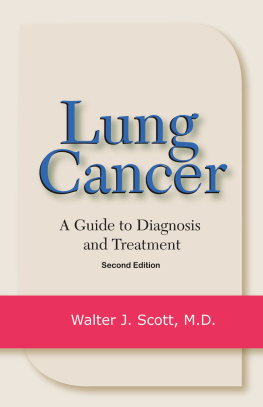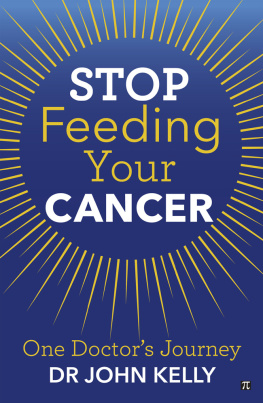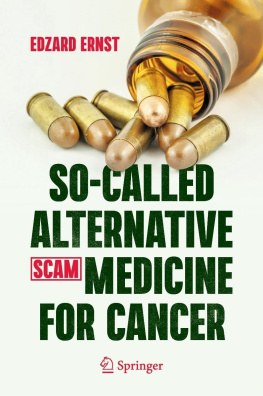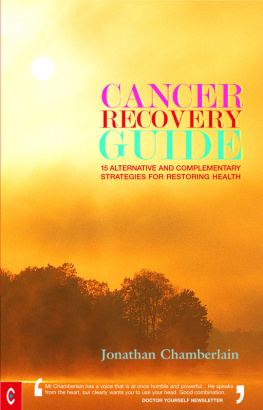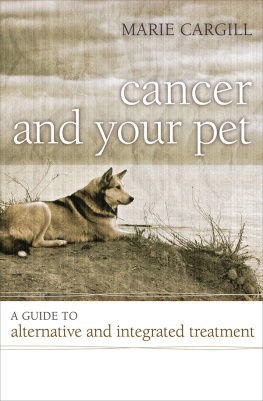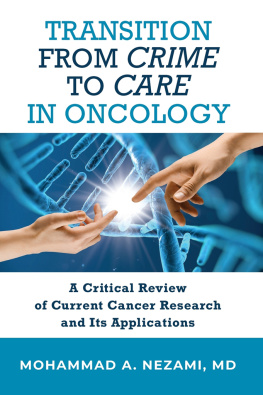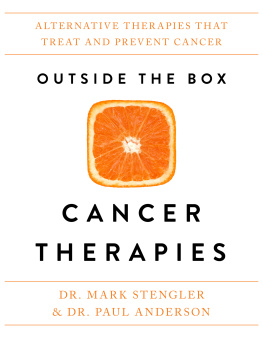This book is for informational purposes only. It is not intended to substitute for professional medical advice. A healthcare professional should be consulted regarding your specific medical situation. The author and publisher specifically disclaim any and all liability arising directly or indirectly from the use of any information contained in this book. The mention of a product or entity in this book does not imply endorsement of said product or entity by the author or publisher. Finally, medicine is not an exact science, and the author and publisher do not offer any assurances that the information contained herein will cure or prevent any medical condition.
Copyright 2012 James W. Forsythe, MD, HMD
All rights reserved. No part of this book may be used or reproduced in any manner whatsoever without written permission except in the case of brief quotations embodied in critical articles or reviews.

BenBella Books, Inc.
10300 N. Central Expressway
Suite #530
Dallas, TX 75231
www.benbellabooks.com
Send feedback to
Second e-book edition: June 2013
Library of Congress Cataloging-in-Publication Data is available for this title.
eISBN: 978-1-936661-80-0
Editing by Erin Kelley
Copyediting by Shannon Kelly
Proofreading by Cape Cod Compositors, Inc.
Cover design by Allison Bard
Text design and composition by Neuwirth & Associates, Inc.
Indexing by Clive Pyne
Printed by Berryville Graphics
Distributed by Perseus Distribution
perseusdistribution.com
To place orders through Perseus Distribution:
Tel: 800-343-4499
Fax: 800-351-5073
E-mail:
Significant discounts for bulk sales are available. Please contact Glenn Yeffeth at or 214-750-3628.
At least once in every cancer specialists career, a near-death patient appears who inexplicably undergoes a profound healing transformation, resulting in the attending physician becoming haunted by the mystery of what happened and why. For me, that first special patient was a middle-aged woman I had been treating for metastic melanoma to the liver in the early 1980s.
Christine (name changed) had melanoma that had metastasized into several tumors on her liver. She was undergoing conventional chemotherapy when something strange happened; while putting on her boots one day, she was bitten on the leg by a brown recluse spider. Her leg swelled up tremendously, and she had to go to the hospital for treatment. About three weeks after this spider bite, we performed an ultrasound on her and discovered something that shocked the entire medical teamthe liver tumors were gone. It seemed as though the spider venom had jump-started Christines immune systems and vanquished the cancer; it was the only new agent introduced into her body.
Oncologists usually dismiss any anecdotes about miraculous remissions and cancer cures, even though most of them have encountered cases of remission they cant explain. Not only do conventionally trained cancer specialists not want to hear about cases such as Christines, they are hostile toward any physician (like me) who takes an interest in these anecdotes.
Christines remarkable recovery intrigued me. Her experience seemed to indicate that the human immune system can be provoked into successfully treating cancer, even serious cases of the disease like Christines. I began to consider whether this could be done more readily using other substances without resorting to something as strong and as unpredictable as spider venom.
All of my oncology colleagues in the eighties had a conventional outlook toward cancer treatment. Their approach was always to use full-dose chemotherapy and never deviate from accepted protocols. We knew that chemo was killing good cells, but we just hoped it was killing enough bad cells too. There were fewer than twenty drugs being used in those early days of oncology and they had devastating side effects. All of the patients became horribly sick from the treatment and most of them relapsed within a few years.
When I entered the field of oncology medicine in the early 1970s at the University of California at San Francisco, it was a relatively new subspecialty of internal medicine. President Richard Nixon had declared the federal War on Cancer, and there was a lot of hope that with this huge influx of funding for cancer research, we might soon find a cure, or at the very least develop some treatments that extended the life spans of cancer patients.
My entry into the cancer field occurred the first year that the boards were offered for this certification, and I joined a class of what later turned out to contain the rock stars of oncology. Included in this group were Sydney Salmon, MD; David Golde, MD; Mick Haskell, MD; and David Albers, MD. All of these physicians would head up programs at various universities across the country and become extremely important figures in the field of cancer treatment.
It was during my training at UC San Francisco that I discovered how arbitrary the cancer treatment protocols we were learning had already become. Someone higher up in the field would get an idea that we should prescribe a particular drug twice a week for this or that cancer and it should be the standard dose. Many times there was no scientific evidence behind what they were saying. Because we were trainees, we had to follow their exact protocol, whether it was evidence based or not.
Some drugs came in such a high dose that every single patient who was prescribed the drug had to have the dose lowered. Every recommendation was arbitrary, and it put our patients on the losing end of a vicious trial and error. And despite the lack of evidence, these physicians and administrators were declaring the protocol to be an exact science, a sort of gold standard for medical practice. The obvious shortcomings bothered me a lot.
When I attended oncology conventions there would be an exercise in which a cancer case would be presented and everyone would vote on how they would treat that particular case. There was never a consensus about treatment. Of the specialists present, 60% might say one type of drug should be used, while 40% voted otherwise. I would think to myself, How can this be? These physicians were all oncologists. They should have been on the same page. But they never were; unfortunately for cancer patients, they still arent.
More than 100 cancer drugs are out there today (some in use without FDA approval), and there is no consensus on which drugs to use, what doses to use, how long to give them, or which types of cancer respond best to those drugs. All of these decisions are made arbitrarily, turning the patients into virtual guinea pigs.
MY APPROACH TO TREATMENT EVOLVES

The biggest epiphany for me following Christines spiderbite-induced cancer remission came after consulting the cancer survival rates. Five years after being diagnosed with cancer, only 2% of Stage IV cancer patients were still alive, after being subjected to repeated rounds of toxic treatment.
Confirmation of my observations later came in an article written in the Journal of Oncology in 2004 that noted how in a large retrospective study, the overall survival rate for patients with Stage IV cancer receiving chemotherapy was only 2.1% in the United States, and in a similar study done in Australia showed only a 2.3% survival rate.

